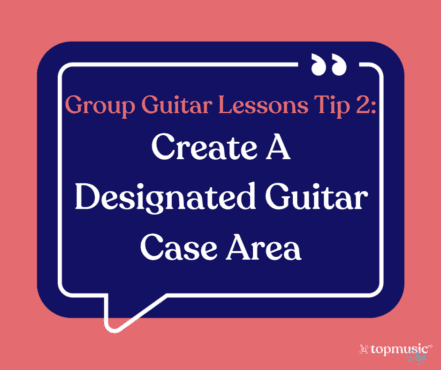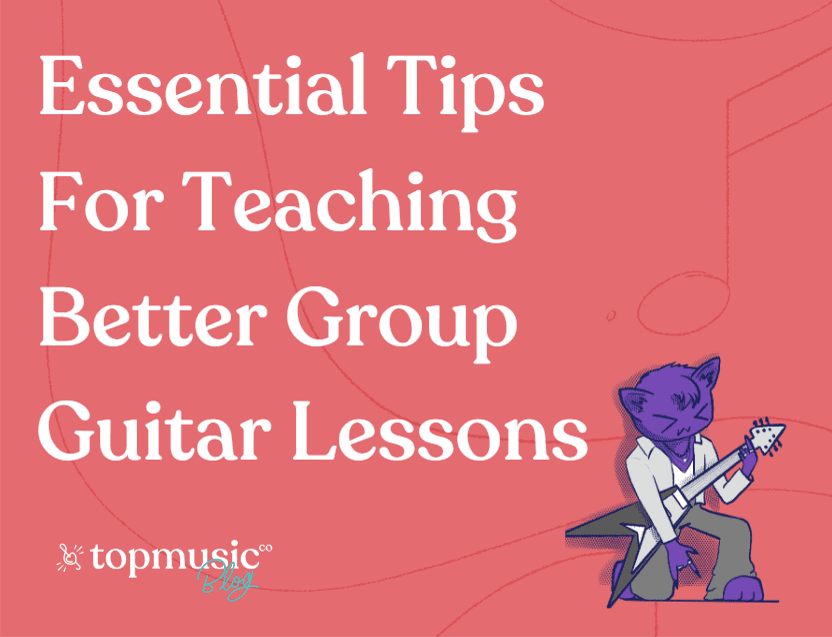Teaching group guitar lessons can be a challenging but incredible rewarding experience. Read our essential tips to help you not make the mistakes we made!
Teaching group guitar lessons can be a challenging but incredibly rewarding experience.
Not only does it provide a great opportunity to help more people learn how to play the guitar, but it can also be a means of making more money in less time.
As an experienced guitar teacher, I’ve faced my fair share of struggles and failures when teaching groups. I want to share my insights with other teachers so you can avoid making the same mistakes I did.
TABLE OF CONTENTS:
Let me introduce myself.
I’m Michael and I’m the Head of Guitar at TopMusic.
I’ve been teaching guitar professionally for over 15 years. The last eight years have been spent teaching group guitar lessons almost exclusively for 95% of my students.
My school, Melbourne Guitar Academy, is the highest-rated guitar school in Australia (according to Google). What’s more, every single one of our top students has come out of a group lesson program. That even includes a student who was the top scorer and guitar player for the entire state of Victoria in his VCE Guitar Exams a few years back.
I’ve also written over 12 books on guitar as part of my Guitar Ninjas Program which is a special Guitar Curriculum written specifically for group guitar lessons.
Every tip has been trialed and tested in my studio at some point during the last 15 years. I’m happy to say that they’ve all my life much easier and lessons way more fun for my students.
Related: Meet Michael Gumley, Head of Guitar

Having your students tune up their guitars ahead of the group guitar lesson is a simple but important step.
Tuning guitars can be a time-consuming activity that disrupts the flow of a lesson. Encouraging your students to tune up before class can save valuable time and allow your lessons to start on schedule.
It also encourages your students to take ownership of their instrument and their learning. Tuning a guitar is a fundamental skill for any guitarist. By asking your students to tune up before class, they start taking responsibility for their learning and development. This can help build confidence and a sense of pride in their accomplishments.

It’s also important to note that by tuning up themselves, your students will develop a better ear for pitch and intonation. By regularly tuning their guitars, your students will become more attuned to the nuances of pitch and tone.
Ensure that you’ve shown your younger and beginner students (and their parents) how to tune their instruments. Advise them to arrive a few minutes early to double-check check their guitar is in tune before class begins.
Encouraging your students to tune up before class is a small but important step that can have significant benefits for their development as musicians.
Having a designated spot for guitar cases in your classroom is an essential element of good classroom management.
This straightforward step can help create a more organized and efficient learning environment for your students. It also ensures your classroom stays safe and tidy (you don’t want anyone accidentally tripping over guitar cases!)

A designated guitar case area can also help your students develop a sense of ownership and responsibility. By asking everyone to put their cases in a specific place, you’re encouraging them to take accountability for their equipment (and also their learning environment).
Using a points system to incentivize good behavior during group guitar lessons can be an effective way to encourage your students to stay focused, engaged, and motivated.
By offering rewards for good behavior, you create a positive and supportive learning environment, while also reinforcing positive habits and attitudes.
To implement a points system, you might consider awarding points for a variety of positive behaviors. These could include:
You might also consider offering bonus points for exceptional effort or achievement.

Rewards for good behavior might include small prizes such as stickers, pencils, or other small trinkets. You could also have large rewards such as extra practice time or the opportunity to perform a solo or lead a group song.
Whatever rewards you choose, ensure they’re meaningful and appropriate for your students’ ages and skill levels.
A points system can be an effective way to create a positive and supportive learning environment. What gets rewarded, gets repeated.
Related: Stop Teaching Guitar Like This!
Organizing your group guitar lessons according to age, level, and ability is essential.
By grouping students of similar abilities you can ensure they’re all working towards similar goals and progressing at a similar pace.

Students of a similar age tend to be at a similar level of development. If you have any students who advance quicker, you can always put them in groups so they can collectively move at a faster pace.
By creating well-matched groups, you can help your students progress at a faster pace while fostering a sense of community and collaboration.
Related: Teach More Engaging Beginner Guitar Lessons Today in 5 Easy Steps
Another way to organize your groups is by offering specialist lessons for students with niche interests or goals.
This is an excellent way to provide targeted and personalized instruction in group guitar lessons. You can help students pursue their specific passion which boosts their motivation and engagement and also provides a more diverse learning experience.

When creating specialist groups it’s important to consider the interests and backgrounds of all your students. For example, you might consider offering a group for students with an interest in a specific style of music, such as blues or jazz. Alternatively, you might offer a group for students who want to focus on a specific technique, such as fingerpicking or slide guitar.
Not only do specialist groups improve your students’ motivation, but they can help inspire you with your lesson plans and topics.
Specialist groups can also help you attract and retain students who might not be interested in general guitar lessons but are looking for a class in, for example, songwriting. This can help grow your business and build your reputation as an expert guitar teacher.
Related: Keep Your Guitar Students From Quitting with 6 Steps for Better Results
I hope these tips will help you when it comes to running your group guitar lessons.
Let me know in the comments which tip is your favourite, and if you have any extra tips please share them!
If you’ve found these teaching tips helpful, there is a wealth of additional information and courses in our TopMusicGuitar Membership.
